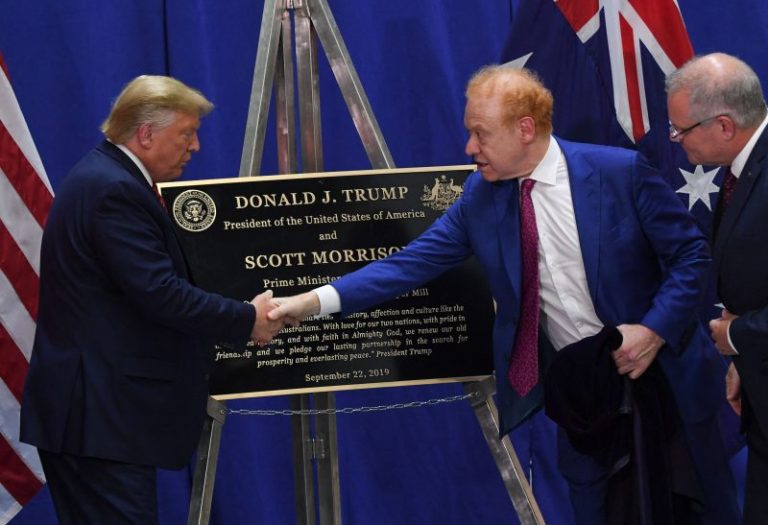Republicans spent the end of the 2016 presidential campaign consumed with the idea that Hillary Clinton had violated the sanctity of classified documents. But they’ve shown remarkably little concern about extensive evidence that Donald Trump allegedly exposed such documents himself.
Even long after the search of Mar-a-Lago that turned up documents Trump had kept after leaving the White House, a poll showed that two-thirds of Republicans simply didn’t believe Trump actually had classified documents. Just 14 percent of Republicans said they would be “very concerned” if any classified documents Trump retained fell into the wrong hands. And a poll last month showed that only 18 percent of Republicans thought Trump’s criminal indictment over his retention and failure to return classified documents was “very serious.”
But there’s one way Trump’s actions could be tougher to shrug off: if they involved nuclear secrets and military capabilities. In a CBS News/YouGov poll after Trump’s June indictment, nearly half of Republicans said it would be a national security risk if Trump had “documents regarding U.S. nuclear systems or military plans.”
ABC News reported Thursday that Trump allegedly shared sensitive information about U.S. nuclear submarines with an Australian billionaire at Mar-a-Lago. The report, which The Washington Post has not confirmed, suggests that there may yet be more evidence that Trump dealt cavalierly with such information.
The information reportedly involved the number of nuclear warheads U.S. submarines carry and how close they can get to a Russian submarine without detection. The billionaire, Anthony Pratt, according to ABC, allegedly shared the information with at least 45 people, including “more than a dozen foreign officials.”
We don’t know how accurate or sensitive the information Trump allegedly shared was. A former Australian ambassador played down the significance to the New York Times, noting that Australia has a military alliance with the United States and the countries share sensitive information. But exposing such information outside official channels and having it dispersed widely would seem to be suboptimal.
It’s also important to emphasize that Trump hasn’t been charged with a crime regarding this episode; it is not mentioned in his classified documents indictment, although ABC reports that special counsel Jack Smith has investigated it.
But it would hardly be the only evidence that Trump has exposed such information. And the report reinforces the possibility that Trump’s classified documents indictment could be his most legally problematic — and the most difficult for him and his allies to dismiss as being part of a political witch hunt.
It’s not even so much the specific information alleged in the ABC report; it’s what it and other evidence betrays about the pattern of Trump’s conduct. And episodes like this could certainly help Smith establish a pattern — to the extent he hasn’t already.
Two documents in Trump’s indictment are cited as including nuclear information — one top-secret document “concerning nuclear capabilities of a foreign country” and one document with a lower classification level “concerning nuclear weaponry of the United States.”
We do not know whether Trump’s alleged conversation with the Australian was based on a document he kept.
A key aspect of the ABC report is how Trump allegedly shared the information. It says he leaned in “toward Pratt as if to be discreet.”
This carries echoes of one of two instances from Trump’s indictment in which he is alleged to have shown off classified information. The instance involved Trump’s acknowledging, even as he was allegedly presenting a document about a plan to attack Iran to a writer and a publisher, that “this is classified” and “this is still a secret.” Trump initially brushed this off as mere bravado and suggested that the document didn’t exist, but then Smith called his bluff by citing a specific document in the indictment. (The document is described as being top secret.)
The claims in ABC’s report also echo what may be Trump’s most infamous decision to share sensitive information — when he disclosed highly classified information about the Islamic State to the Russian foreign minister and ambassador. Unlike Russia, Australia is our ally. But both instances showed Trump appearing to be cavalier about sharing such information with foreigners.
Concerns were raised even earlier about Trump’s possibly having exposed information regarding nuclear capabilities.
In 2017, a month before Trump’s conversation with the Russians in the Oval Office, a transcript from the Philippines government later obtained by The Washington Post showed Trump talking with the country’s then-president, Rodrigo Duterte, about how the United States had two nuclear submarines off the coast of the Korean Peninsula. While some in the Pentagon anonymously expressed concern, the deployment of such submarines to the region was publicly announced. Still, this conversation came just two months after a Washington Post report about how Trump had strategized out in the open at Mar-a-Lago about a response to a ballistic missile test by North Korea.
In 2019, Trump appeared to tacitly confirm that the United States had nuclear weapons in Turkey. Again, this wasn’t terribly surprising — it was an open secret — but the U.S. government and NATO allies have a policy of not disclosing the locations of nuclear weapons.
The sum total is a picture of a man who shows little concern about protecting the kind of highly sensitive information that he repeatedly attacked Hillary Clinton for allegedly exposing with her private email server.
“Like the Cold War, we also need to fight this battle by collecting intelligence and then protecting — protecting — our classified secrets,” Trump said in September 2016, adding: “We can’t have someone in the Oval Office who doesn’t understand the meaning of the word ‘confidential’ or ‘classified.’”
Republicans might never judge Trump harshly for his sins on this front. But indications are that he could have some explaining to do to the rest of America when he goes to trial.

